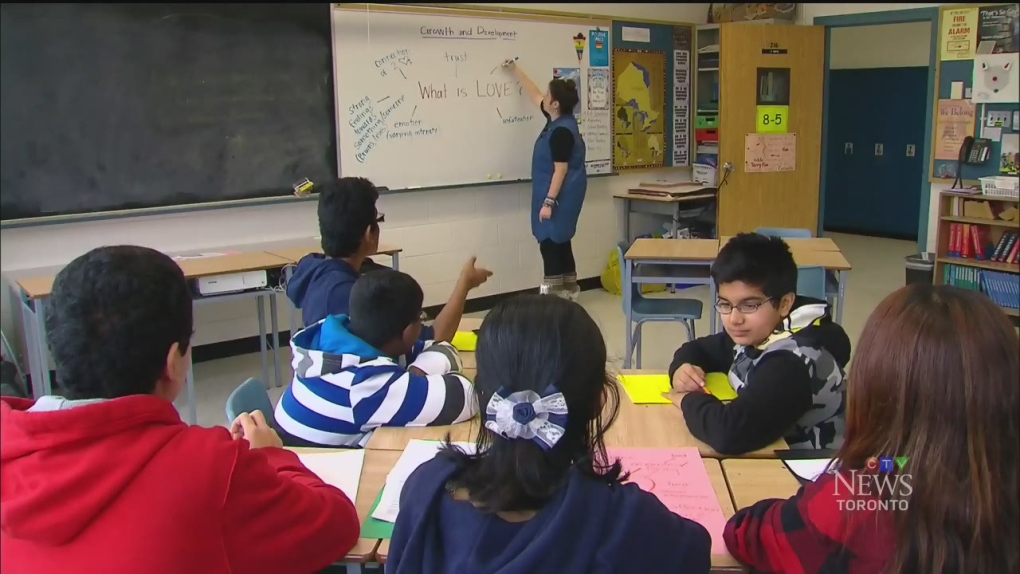Laurier researcher says more support programs needed for marginalized, racialized students’ return to classroom

A new study out of Wilfrid Laurier University in Waterloo suggests extracurricular support programs are needed for marginalized and racialized students to help deal with learning loss as they return to the classroom.
Ardavan Eizadirad, an assistant professor in the faculty of education at the university, is working to shift the narrative in mainstream education circles to focus on closing the opportunity gap.
He says the systemic barriers racialized students and those from lower socioeconomic backgrounds face were worsened by the pandemic.
The study specifically examined a program, offered in Toronto’s Jane and Finch neighbourhood called the Community School Initiative, to understand the impact of COVID-19 on learning loss and explore ways to close opportunity gaps.
“You’ll hear everyone talking about all of the learning that was lost due to the pandemic and the need to return to normal, but we actually don’t want to return to normal because normal wasn’t really working for many students,” said Eizadirad in a media release.
He notes the transition to remote learning only exacerbated inequities, as many students in marginalized or racialized communities don’t have access to a laptop or a quiet place to work at home.
“What we need to do is create new education policies and practices that aim to work on student achievement from an equity lens,” he added.
A 2019 Colour of Poverty report shows only 53 per cent of Black students and 48 per cent of Indigenous students were enrolled in academic programs as opposed to non-academic programs. That’s compared to 81 per cent of white students, who also have a higher high school graduation rate.
Eizadirad suggests that when community organizations, parents, educators and school boards work together to identify opportunity gaps, students benefit. The goal, he says, is to create extracurricular learning opportunities that represent the diversity of a school community.
His study shows the initiative, which provided extracurricular support services at a fraction of the typical cost, effectively minimized the achievement gap during the pandemic by creating access to academic opportunities that were affordable and culturally relevant for families living in the Jane and Finch area.
The final report and its findings and recommendations can be found here.
CTVNews.ca Top Stories

Police locate labyrinth of tunnels connecting tents to generator in Hamilton encampment
Hamilton police say that they discovered a series of “man-made holes and tunnels” during a patrol of a downtown encampment earlier this week.
BREAKING George Kresge Jr., who wowed talk show audiences as the The Amazing Kreskin, dies at age 89
George Joseph Kresge Jr., who was known to generations of TV watchers as the mesmerizing entertainer and mentalist The Amazing Kreskin, has died at age 89.
Canada Post strike: Talks deadlocked as sides clash on wages
Negotiations between Canada Post and the union representing its workers appear to be in a deadlock as the two sides remain far apart on wages and other issues.
Meta working on resolving Facebook, Instagram outage
Meta users are experiencing a widespread outage, including applications like WhatsApp, Instagram, Facebook and Facebook Messenger, according to third-party website Downdetector.com. Meta acknowledged the issue and is working on resolving the outage.
Bank of Canada drops key interest rate to 3.25%, Trump tariff threat 'new source of uncertainty'
Canada's central bank has cut its key rate for the fifth consecutive time – now sitting at 3.25 per cent – as the country's economy grows at a slower rate than projected.
Police identify murder victim whose skull was found in Ontario river more than three decades ago
Police have identified a man whose skull was found almost 40 years ago in a Peterborough-area river.
'Baseball-sized hail': Toronto man owes car rental company $18K after hailstorm
A Toronto man is on the hook for about $18,000 after a car he rented over the summer was pelted by baseball-sized hail.
Poilievre's Conservatives still in majority territory: Nanos seat projections
The Liberals' promise of a temporary GST break and $250 rebate cheques haven't benefited Prime Minister Justin Trudeau and his minority government when it comes to public support, according to Nanos Research data.
New Vancouver mom temporarily discharged from hospital to see Taylor Swift concert
A Vancouver woman didn’t let an emergency C-section keep her from Saturday’s Taylor Swift concert.































